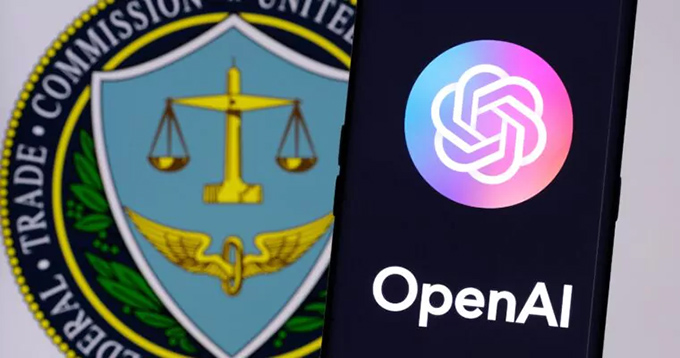FTC Probe Of OpenAI: Implications For AI Regulation And The Future Of ChatGPT

Table of Contents
The FTC's Concerns Regarding OpenAI and ChatGPT
The FTC's investigation into OpenAI centers on several key areas, each raising significant concerns about the ethical and legal implications of deploying powerful AI models like ChatGPT.
Data Privacy Violations
OpenAI's data collection practices are under intense scrutiny. The FTC is concerned about potential breaches of user privacy stemming from:
- Lack of Transparency: Users may not fully understand how their data is collected, used, and protected. The opacity surrounding data handling practices raises serious concerns.
- Potential for Bias in Data Sets: The data used to train ChatGPT may reflect existing societal biases, leading to discriminatory or unfair outcomes. This raises ethical questions regarding fairness and equity.
- Data Security: Concerns exist regarding the security of user data and the potential for data breaches or unauthorized access. Robust data security measures are paramount.
- GDPR and CCPA Compliance: OpenAI's adherence to data privacy regulations like the GDPR (General Data Protection Regulation) and CCPA (California Consumer Privacy Act) is also under investigation. Meeting these standards is crucial for maintaining user trust.
Misinformation and Algorithmic Bias
ChatGPT's ability to generate human-quality text also presents risks. The FTC is worried about:
- Spread of Misinformation: The model's capacity to generate convincing but false information poses a significant threat, particularly regarding sensitive topics like politics and health.
- Amplification of Existing Biases: Algorithmic biases within the model can lead to the generation of discriminatory or harmful content, perpetuating societal inequalities.
- Deepfakes and Synthetic Media: The technology underlying ChatGPT could be used to create convincing deepfakes, further exacerbating the spread of misinformation.
- Difficulty in Detecting Bias: Identifying and mitigating bias in large language models is a significant technical challenge.
Consumer Protection Issues
The FTC is also examining potential harm to consumers resulting from inaccurate or misleading information generated by ChatGPT. This includes:
- Financial Scams: ChatGPT could be used to create convincing phishing emails or other fraudulent communications.
- Medical Misinformation: The provision of incorrect or harmful medical advice by the model poses significant risks to public health.
- Biased Advice: The model's potential to offer biased advice in various contexts (e.g., financial, legal) could lead to significant harm for consumers.
- Liability Concerns: Determining liability in cases of harm caused by AI-generated information is a complex legal issue.
Implications for AI Regulation
The FTC's investigation highlights the urgent need for a robust regulatory framework for AI.
The Need for Comprehensive AI Legislation
Proactive AI legislation is essential to:
- Establish Clear Guidelines: Regulations need to define acceptable uses of AI, data handling practices, and liability frameworks.
- Promote Responsible Development: Legislation can incentivize the development of ethical and safe AI systems.
- Learn from Other Industries: Regulatory pathways for pharmaceuticals and autonomous vehicles offer valuable lessons.
- Balance Innovation and Safety: Regulations must be carefully crafted to avoid stifling innovation while protecting consumers.
Global Harmonization of AI Standards
Creating internationally consistent AI standards is crucial:
- Global Collaboration: International cooperation is needed to develop shared ethical principles and regulatory frameworks.
- Addressing Legal Differences: Harmonization needs to account for the different legal and cultural contexts across countries.
- Preventing Trade Barriers: Inconsistent regulations could create barriers to the international trade of AI technologies.
Impact on Innovation
Regulation can either stifle or encourage AI innovation:
- Regulatory Sandboxes: These controlled environments allow for testing new AI technologies under regulatory oversight.
- Self-Regulation: Industry bodies can play a role in establishing ethical guidelines and best practices.
- Impact Assessments: Regulatory impact assessments are crucial to evaluate the potential effects of new regulations.
The Future of ChatGPT and Similar AI Models
Addressing the FTC's concerns requires technological advancements and adaptation to the regulatory landscape.
Technological Advancements in Mitigating Risks
Progress in AI safety and security is crucial:
- Explainable AI (XAI): Making AI decision-making processes more transparent can improve accountability and reduce bias.
- AI Safety Research: Investment in AI safety research is crucial to developing techniques for detecting and mitigating risks.
- Robustness and Security: Building more robust and secure AI models is vital to prevent misuse and manipulation.
Adapting to the Regulatory Landscape
OpenAI and other AI companies must adapt their practices:
- Corporate Social Responsibility: Companies must take responsibility for the ethical implications of their AI technologies.
- AI Ethics Research: Investment in AI ethics research is essential to inform responsible AI development.
- Internal Policy Changes: Companies need to implement clear internal policies to ensure compliance with future regulations.
Conclusion: Navigating the FTC Probe and Shaping the Future of ChatGPT
The FTC's investigation into OpenAI signifies a critical turning point for AI regulation. The probe's implications are far-reaching, impacting not only OpenAI but also the future development and deployment of ChatGPT and similar AI models. Responsible AI development requires a proactive approach involving technological advancements, ethical considerations, and clear, comprehensive regulatory frameworks. Staying informed about the FTC's OpenAI investigation and participating in the conversation surrounding AI regulation for ChatGPT is crucial to shaping a future where AI benefits society while mitigating potential harms. The responsible development of ChatGPT and similar AI technologies hinges on navigating this complex landscape effectively. Let's work together to ensure AI's positive impact on our future.

Featured Posts
-
 Englands Heatwave Death Toll Reaches 311 Lessons Learned And Future Prevention
May 30, 2025
Englands Heatwave Death Toll Reaches 311 Lessons Learned And Future Prevention
May 30, 2025 -
 El Servicio Militar Y El Futuro De Bts Un Analisis De Su Regreso
May 30, 2025
El Servicio Militar Y El Futuro De Bts Un Analisis De Su Regreso
May 30, 2025 -
 Kyriaki 16 Martioy Ti Na Deite Stin Tileorasi
May 30, 2025
Kyriaki 16 Martioy Ti Na Deite Stin Tileorasi
May 30, 2025 -
 Bruno Fernandes Buscando Justica E Transparencia No Processo
May 30, 2025
Bruno Fernandes Buscando Justica E Transparencia No Processo
May 30, 2025 -
 Crispr Technology Efficient Whole Gene Integration In Human Cells
May 30, 2025
Crispr Technology Efficient Whole Gene Integration In Human Cells
May 30, 2025
